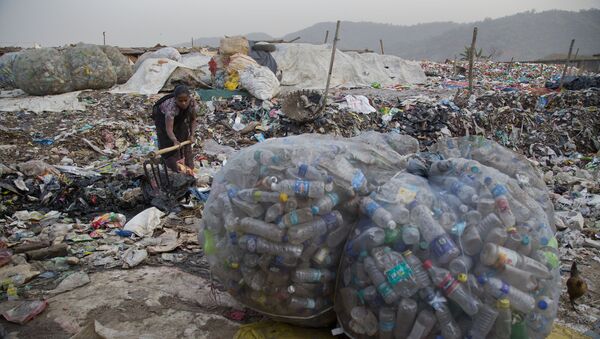With plastic pollution wreaking havoc worldwide, India envisioned itself on the path to getting rid of single-use plastic with a much-expected ban. However, the country has so far refrained from announcing a decisive policy.
Chandra Bhushan, the former deputy director-general of the Centre for Science and Environment, a not-for-profit public interest research and advocacy organisation in New Delhi, told Sputnik that India could be one of the leaders in banning single-use plastics.
“Very few countries have even decided to ban single-use plastics. Developed countries are not the leaders in creating plastic waste management policies, but developing nations are. And India can be the leader worldwide,” he said.
In 2002, Bangladesh became the first Asian country to ban thinner plastic bags. Morocco had announced a nation-wide ban on the production and use of plastic bags in 2016. Kenya followed suit, abolishing the use of plastic bags in 2017.
A decision on a single-use plastic ban, as promised by India's prime minister, would have put India at the forefront of regulations to eliminate plastic pollution, well ahead of the European Union, media reports said.
“I think India opted for a bottom-to-top approach. As per the direction by the Indian Ministry of Environment and Forestry, States have been asked to formulate their own policies and take the lead,” Bhushan said.
The State governments of Odisha, Andhra Pradesh and Goa have announced policies regulating and banning the use of plastics. Authorities including Indian ministries and organisations such as Airport Authorities of India have also banned single-use plastics from their premises.
However, the noted environmentalist raised concerns over the implementation of these policies, saying “it is not up to the mark”.
“Implementation is always a challenge. We tend to form regulations really fast, but don’t build the groundwork required – increasing the capacity of municipal departments (civic bodies) and State pollution control boards,” he said.
“Banning a product has to be done in a phased manner and by building an alternative industry. If you have to ban an industry, it has to be done with a carrot-and-a-stick approach - you have to provide them with incentives,” he added.
Reportedly, after the prime minister’s call for a ban on single-use plastics on India’s Independence Day, industries in the country raised major concerns, citing the lack of an alternative.
The Federation of Indian Chambers of Commerce and Industry (FICCI), an association of business organisations in India, said the move would lead to grave losses and unemployment.
“1.3 million personnel across 10,000 firms would immediately lose their jobs. The food processing industry would suffer from a revenue loss of $128 million approximately,” it had said.
India has always been ahead in emphasising its efforts and the need to terminate the use of plastics. At the G-7 Summit in France in August, India talked about the issue.
At the Conference of Parties to the United Nations Convention to Combat Desertification in September, Modi had upheld the country’s resolve to lead global efforts in tackling and curbing single-use plastics usage.




